 |
1st Talk: Genomic approaches for the study of infections
Speaker: Daniella Bartholomeu (UFMG, Brazil)
Audio: in Portuguese
Dra. Daniella Bartholomeu from @UFMG was our first speaker talking about the work her group develops, and how they use genomics and functional genomics approaches to correlate the variability of Trypanosoma cruzi and Leishmania isolates with virulence and pathogenicity profile.
She holds a Master’s degree in Biological Sciences (Molecular Biology) from the University of Brasília, a PhD in Biochemistry and Immunology from the Federal University of Minas Gerais, and a postdoctoral degree from The Institute for Genomic Research, USA.
|
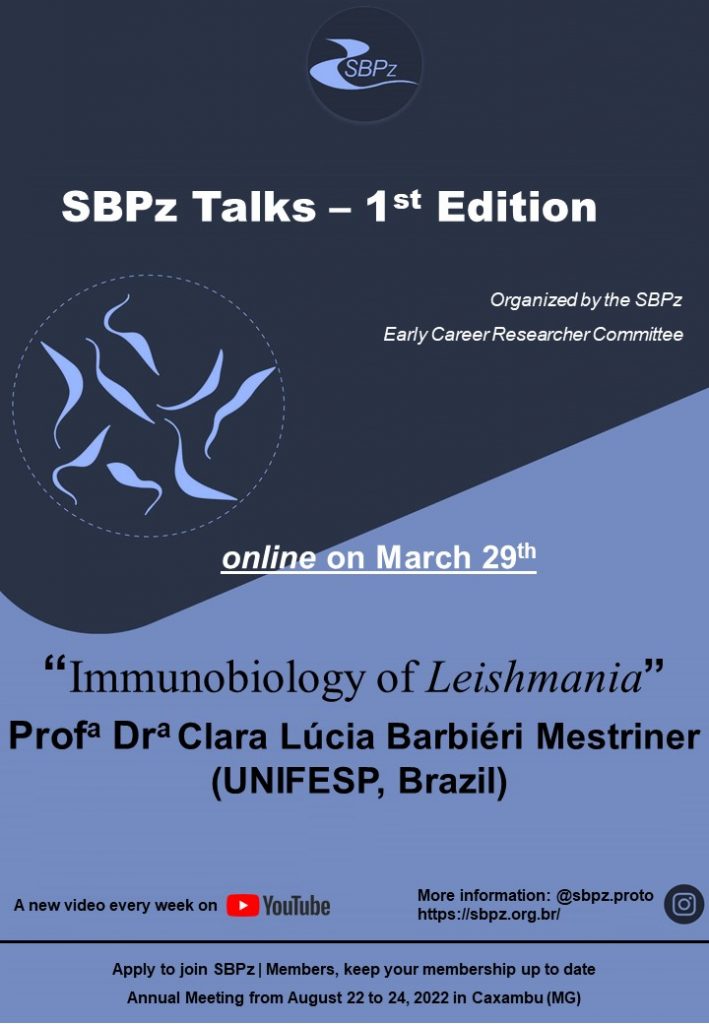 |
2nd Talk: “Immunobiology of Leishmania”
Speaker: Clara Lúcia Barbiéri Mestriner (UNIFESP, Brazil)
Original audio: English
Dr. Mestriner holds a degree in Biomedical Sciences from the Federal University of São Paulo (1972), a Master’s degree (1976) and PhD (1982) in Biological Sciences (Microbiology) from the same institution and postdoctoral at the New York University (1982-1983), United States.
She is currently an associate professor at the Department of Microbiology, Immunology and Parasitology at the Federal University of São Paulo and leader of the Laboratory of Immunobiology of Leishmania. She has experience in the field of Human Parasitology with focus on the development of new treatments for leishmaniasis caused by L. infantum (chagasi) and L. amazonensis species.
|
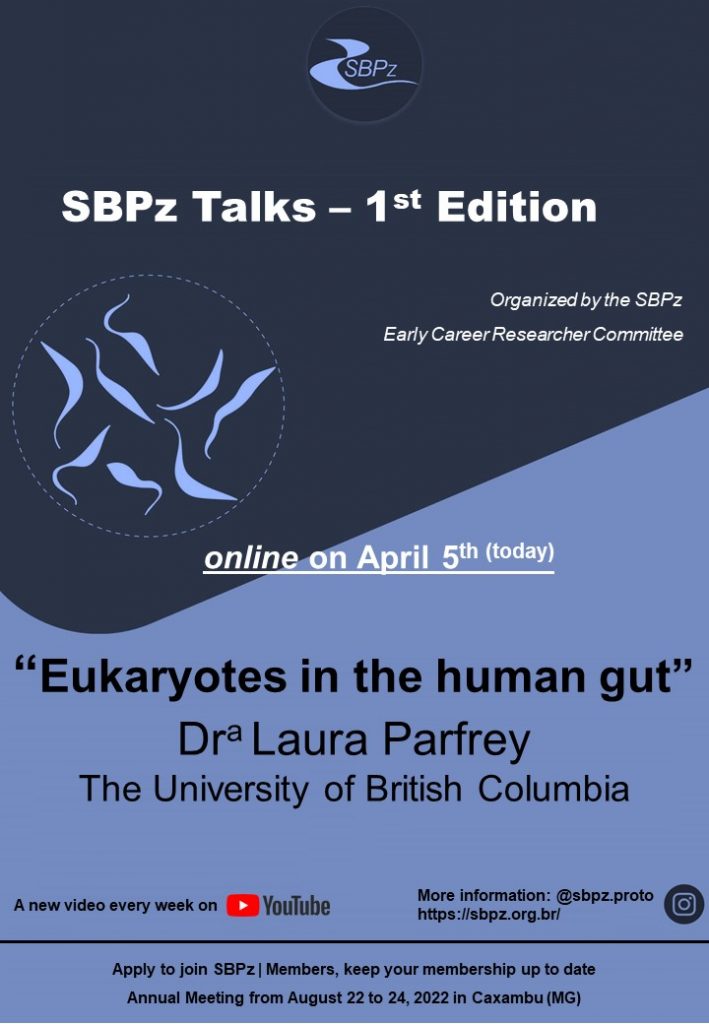 |
3rd Talk:”Eukaryotes in the human gut”
Speaker: Laura Parfrey (The University of British Columbia)
Original audio: English
Dra. Parfrey’s lab focuses on the microbial ecology of eukaryotic microbes (protists) and their interaction with bacteria. Her research in gut microbiome research combines descriptive research with manipulative experiments to ask what is the ‘normal’ community of eukaryotic microbes (aka “parasites”) residing in humans and other mammals, and what are the consequences of losing the microbial diversity. In order to characterize these microbial communities her group uses high-throughput sequencing to understand the factors that structure these communities, as well as phylogenetic framework to gain an evolutionary perspective.
|
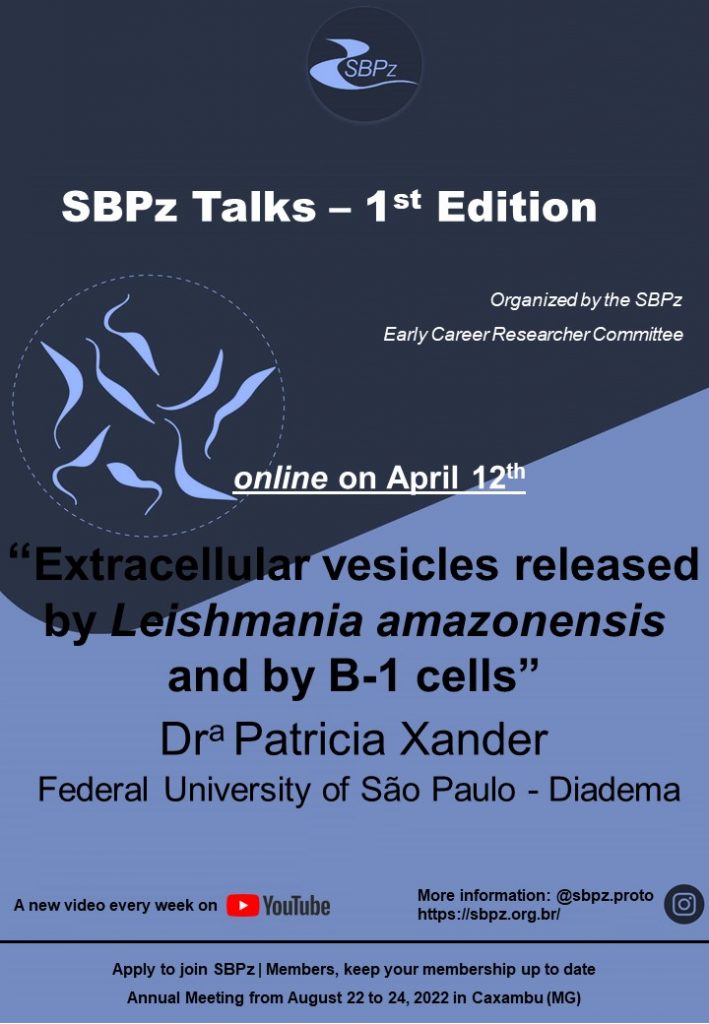 |
4th Talk:”Extracellular vesicles released by Leishmania amazonensis and by B-1 cells”
Speaker: Patricia Xander (Federal University of São Paulo – Diadema)
Original audio: English
Dr. Xander holds a degree in Pharmacology from the State University of Maringá (2000), and a PhD in Sciences from the Federal University of São Paulo (2007). She is currently an Associate Professor at the Federal University of São Paulo (Diadema) working on the role of B-1 cells during infectious and parasitic diseases. In addition, she has been studying the influence of extracellular vesicles (EVs) on host-parasite interaction, in particular the modulation of immune response by EVs.
|
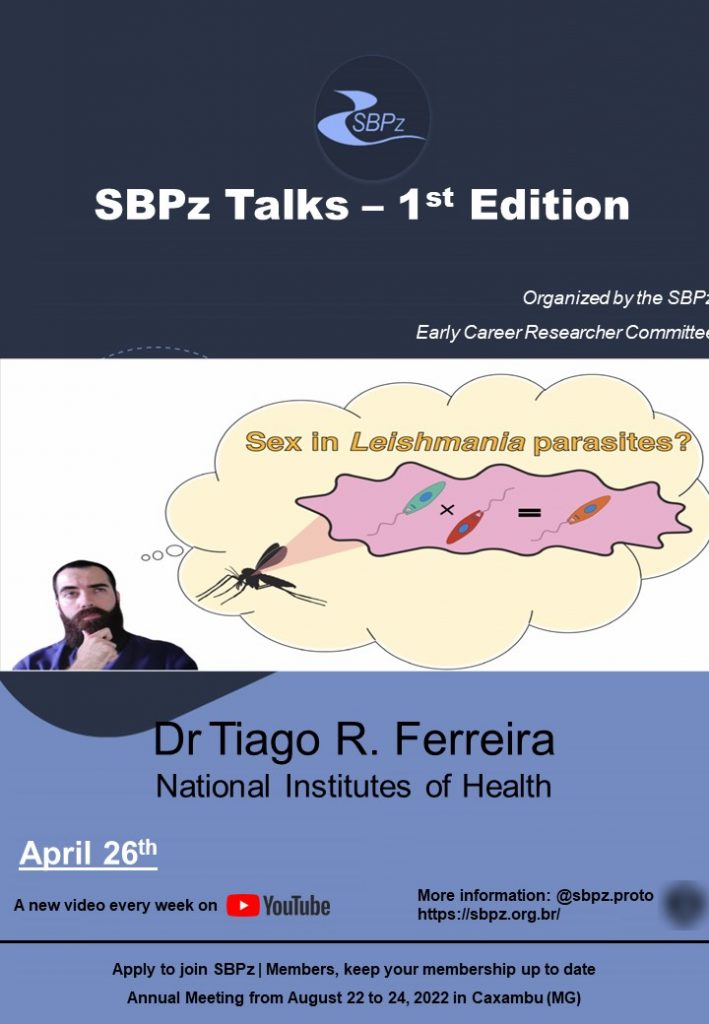 |
5th Talk: “Sex in Leishmania: Insights from single-cell transcriptomics of mating-competent parasites”
Speaker: Tiago R. Ferreira (National Institutes of Health)
Original audio: English
Dr. Tiago Ferreira graduated in Biological Sciences from the University of Brasília and holds a Master and a PhD degree in Cellular and Molecular Biology and Pathogen Bioagents from the Ribeirão Preto Medical School. He has experience in biochemistry, with emphasis on molecular biology of Leishmania and gene expression control. He is currently a Postdoctoral Fellow at the Laboratory of Parasitic Diseases (NIAID-NIH), using single cell transcriptomics to understand the cryptic sexual cycle of Leishmania.
|
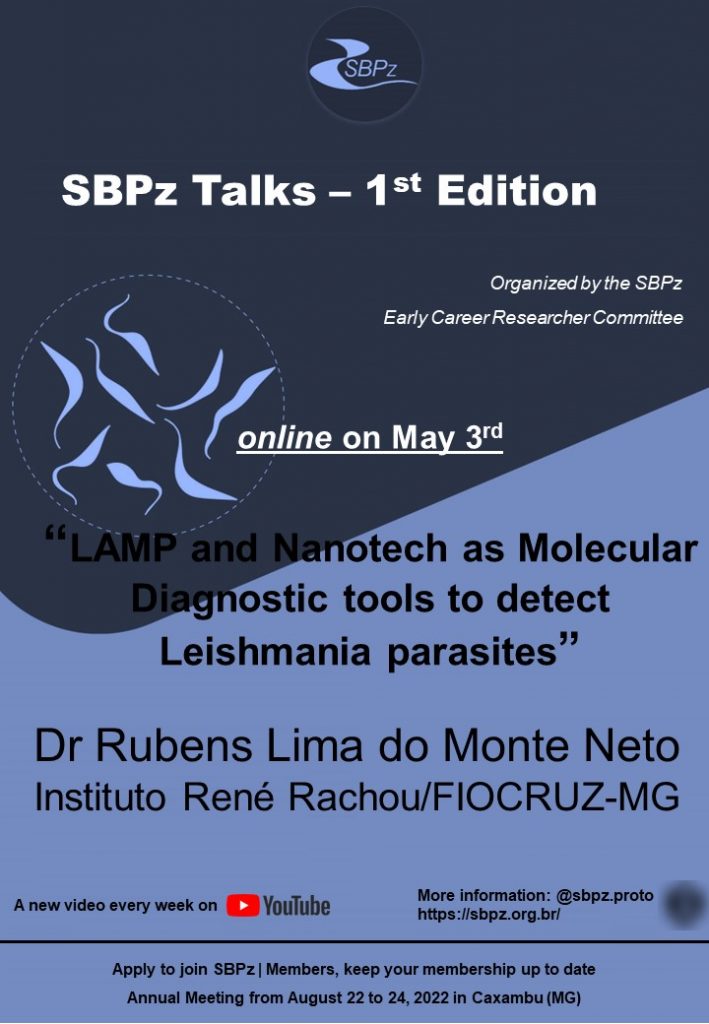 |
6th Talk: “LAMP and Nanotech as Molecular Diagnostic tools to detect Leishmania parasites”
Speaker: Rubens Lima do Monte Neto (Instituto René Rachou/FIOCRUZ Minas, Brazil)
Original audio: English
Dr. Rubens do Monte graduated in Biological Sciences from the Federal University of Paraíba (UFPB) and holds a Master and a PhD degree from UFPB and Federal University of Minas Gerais, respectively, both in Pharmacology. Between 2011-2013 he worked as a postdoctoral fellow in Centre de Recherche en Infectiologie – Université Laval, CRI – CHUL, Canada. He has experience in biochemistry, molecular biology and pharmacology with emphasis on development of molecular diagnostic tools for infectious diseases. He is currently awardee of CNPq Research Productivity and Instituto Serrapilheira grants and co-founder of CEPHA Biotech. Researcher member of the Applied Biotechnology for the study of pathogens group at Instituto René Rachou/FIOCRUZ Minas, Belo Horizonte, Minas Gerais, Brazil.
|
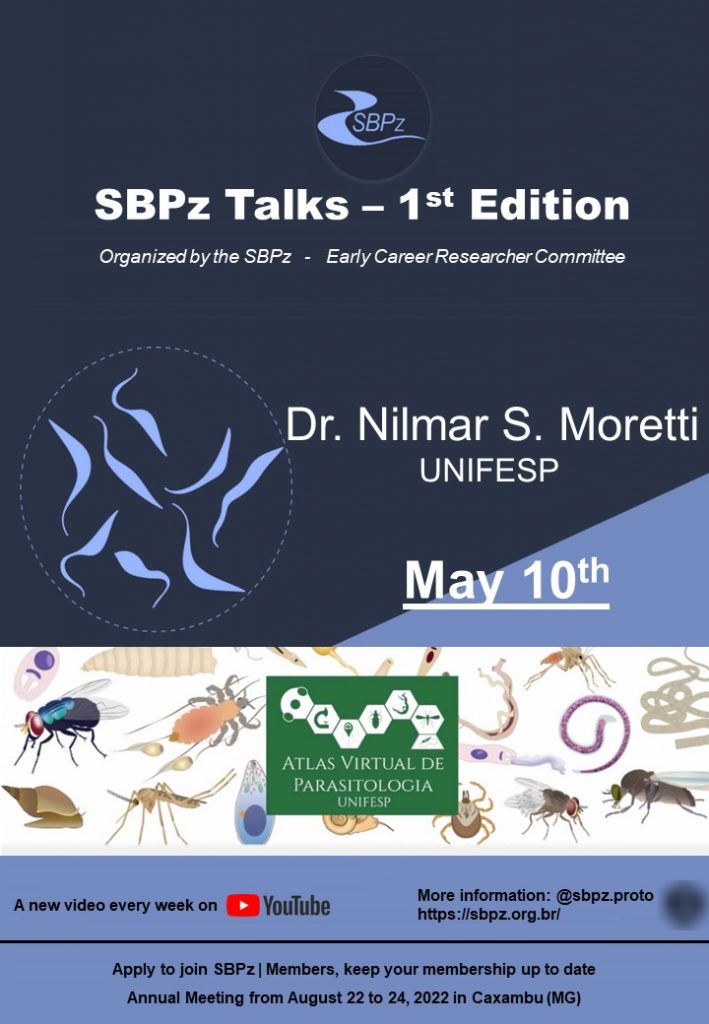 |
7th Talk: “ATLAS VIRTUAL DE PARASITOLOGIA”
Palestrante: Dr. Nilmar S. Moretti (Universidade Federal de São Paulo – UNIFESP)
Audio: Portuguese
Dr. Nilmar Moretti holds a Biology from Universidade Estadual do Oeste do Paraná and a PhD in Cellular and Molecular Biology from Faculdade de Medicina de Ribeirão Preto. He is currently an Adjunct Professor at the Department of Microbiology, Immunology and Parasitology at UNIFESP. His research investigates the role of acetylation in the life cycle progression of eukaryotic pathogens. In this lecture, however, he shared with us the initiative to produce a “Virtual Atlas of Parasitology”, a project he coordinates together with Dr. Patricia Xander with the support of UNIFESP. The Virtual Atlas of Parasitology is composed of didactic materials for teaching and learning Parasitology. Currently, the content includes descriptions of 30 parasitic diseases of medical importance in Brazil and in the world, accompanied by life cycle diagrams and photos of slide preparations, in addition to the presentation of 35 clinical cases. The material is aimed at students of all levels of education, teachers and health professionals, but is developed in an accessible language, allowing easy understanding for all who are interested in the subject. Did we get you curious about it? Watch the video we made available this week! The website is not yet online, but soon we will publish the link for the material that will be available for consultation and download.
|
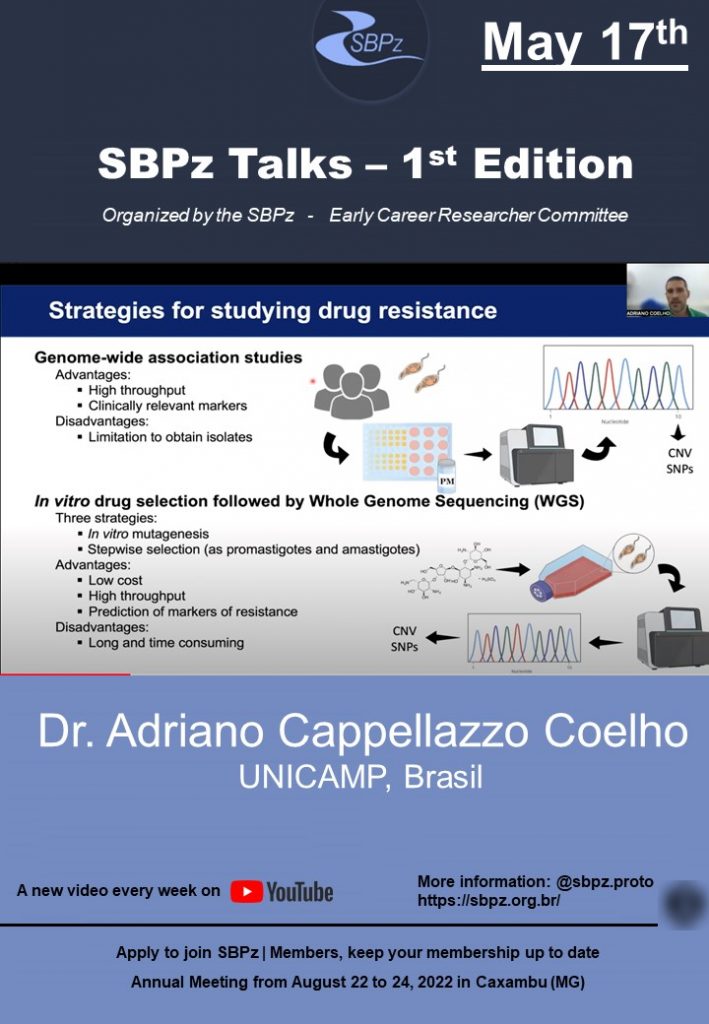 |
8th Talk: “Drug resistance in Leishmania: studies in vitro and in vivo”
Palestrante: Adriano Cappellazzo Coelho (UNICAMP, Brasil)
Audio original: Portuguese
Dr. Adriano Coelho holds a degree in Biological Sciences from Universidade Presbiteriana Mackenzie (2000), a Master’s degree (2003) and PhD (2007) both from University of São Paulo (USP, Brazil) and postdoctoral at the Université Laval, Canada. Currently, he is an associate professor at the Department of Animal Biology, Institute of Biology, University of Campinas, and FAPESP Young Investigator awardee since 2018. He leads research projects in Molecular Parasitology focused on exploring molecular mechanisms associated with resistance/susceptibility of drugs used in leishmaniasis treatment. In this video, he shows the strategies and results about Leishmania genes involved in resistance/susceptibility to miltefosine and paromomycin. Stay tuned and don’t miss it!
|
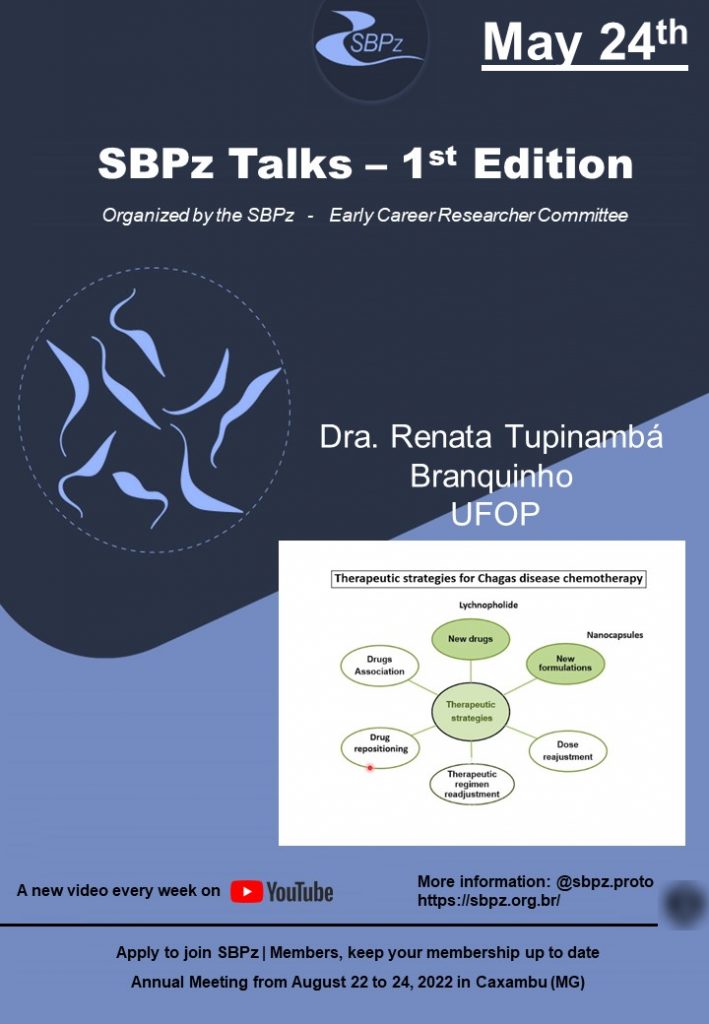 |
9th Talk: “Lychnopholide in nanocapsules cure acute and chronic infections with Trypanosoma cruzi resistant to treatment”
Speaker: Dra. Renata Tupinambá Branquinho (Universidade Federal de Ouro Preto – UFOP)
Audio: Portuguese
Dr. Renata T. Branquinho holds a degree in Pharmacy from the University Center Newton Paiva. She has a Master’s degree in Pharmaceutical Sciences and PhD in Biological Sciences from Federal University of Ouro Preto (UFOP, Brazil), with an internship at the Institut National de la Santé et la Recherche Médicale (Montpellier, France). Currently, she is a researcher at the Pharmacy School of UFOP in the Laboratories of Cell Culture and Animal Studies. She has expertise in pharmacy with emphasis on analytical and bioanalytical pharmaceutical validation, development of pharmaceutical products, pharmaceutical nanotechnology, pharmacokinetics, pre-clinical studies, experimental chemotherapy of Chagas disease, toxicity and cardiotoxicity of synthetic and natural substances.
|
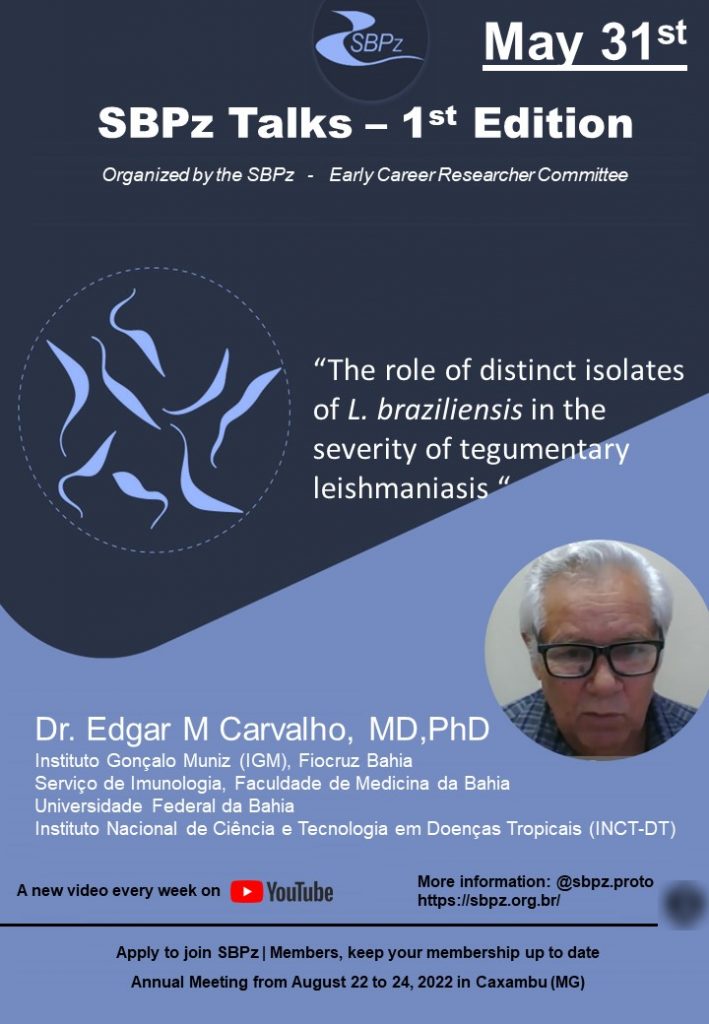 |
10a palestra: “The role of distinct isolates of L. braziliensis in the severity of tegumentary leishmaniasis”
Palestrante: Dr. Edgar Carvalho (Fiocruz Bahia/Faculdade de Medicina da Bahia (UFBA)/Instituto Nacional de Ciência e Tecnologia em Doenças Tropicais)
Audio: Portuguese
O Professor Edgar Carvalho é médico pela Universidade Federal da Bahia (UFBA), com especialização em reumatologia e imunologia pela University of Virginia, possui mestrado e doutorado em Medicina e Saúde pela UFBA e pós-doutorado em Imunologia na Cornell University. É Pesquisador do Instituto Gonçalo Moniz (FIOCRUZ-Bahia), Professor Titular Aposentado de Clínica Médica da Universidade Federal da Bahia, Professor Titular Aposentado de Imunologia da Escola Bahiana de Medicina e Saúde Pública e Pesquisador Associado do Serviço de Imunologia do Hospital Universitário Professor Edgard Santos. É também Professor Adjunto do Weill Cornell Medical College e Professor Adjunto da University of Iowa. Possui formação em Clínica Médica com ênfase em Imunologia Clínica, Doenças Tropicais e Reumatologia, e uma de suas principais áreas de atuação em pesquisa é a imunopatogênese das leishmanioses. No vídeo de hoje o Professor Edgar nos fala sobre sua experiência de mais de 40 anos com os pacientes da região de Corte de Pedra na Bahia e os projetos que realiza com isolados clínicos de L. braziliensis para entender o papel do parasita nas diversas apresentações clínicas de leishmaniose tegumentar.
|
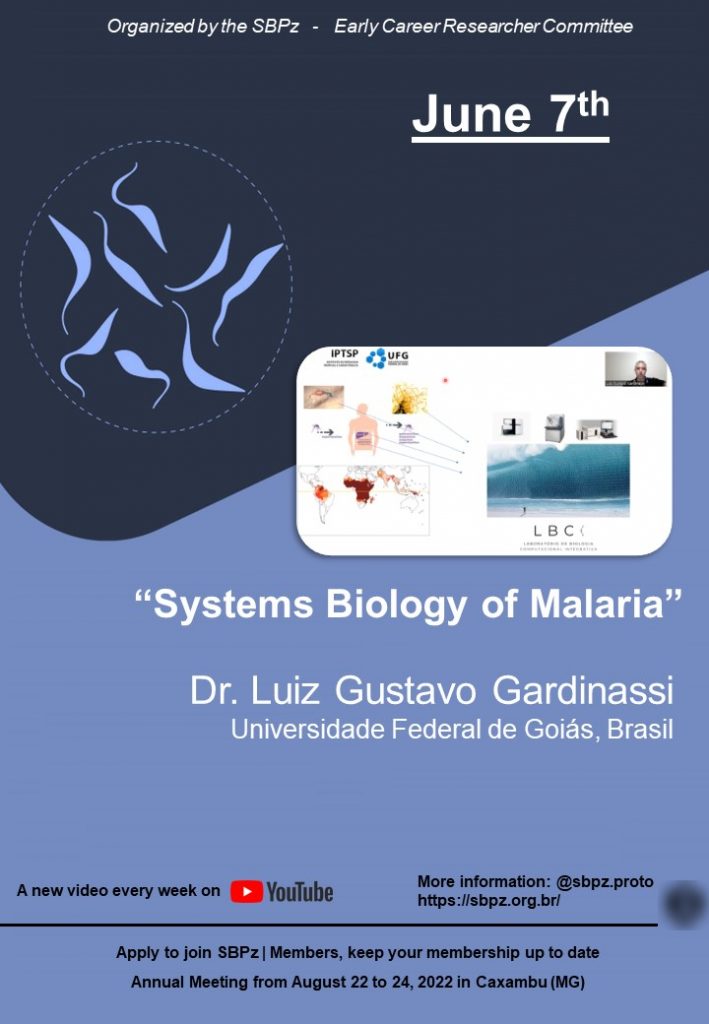 |
11th Talk: “Systems Biology of Malaria”
Speaker: Luiz Gustavo Gardinassi (Universidade Federal de Goiás, Brasil)
Original audio: Portuguese
Dr. Luiz Gustavo Gardinassi is biologist by training (2004) and holds a Master’s degree (2008) in Microbiology, PhD (2015) in Immunology from University of São Paulo (USP, Brazil) and postdoctoral at Emory University School of Medicine (Atlanta, GA, USA) and USP. Currently, he is an associate professor at the Federal University of Goiás, Brazil, where he leads the Laboratory of Integrative Computational Biology supported by Instituto Serrapilheira. In this video, he shows how Systems Biology approaches and multi-omics data integration and re-use are helpful to understanding complex molecular mechanisms involved in Malaria. Stay tuned and don’t miss it!
|












